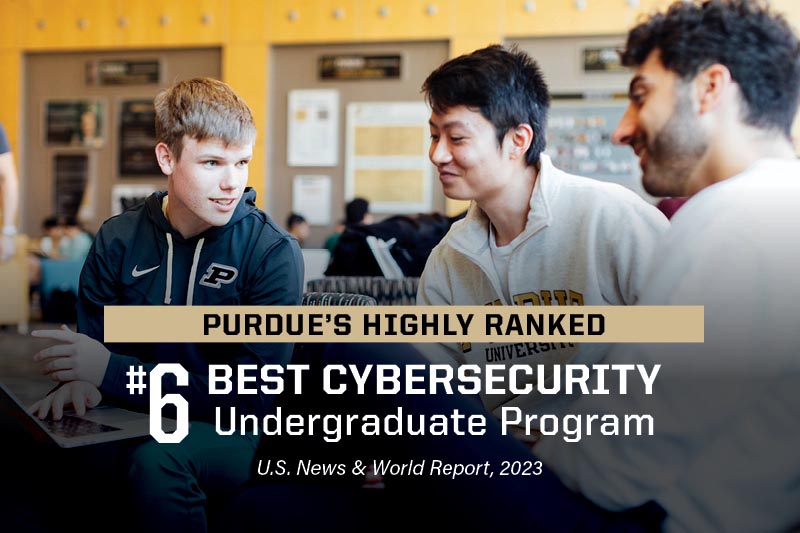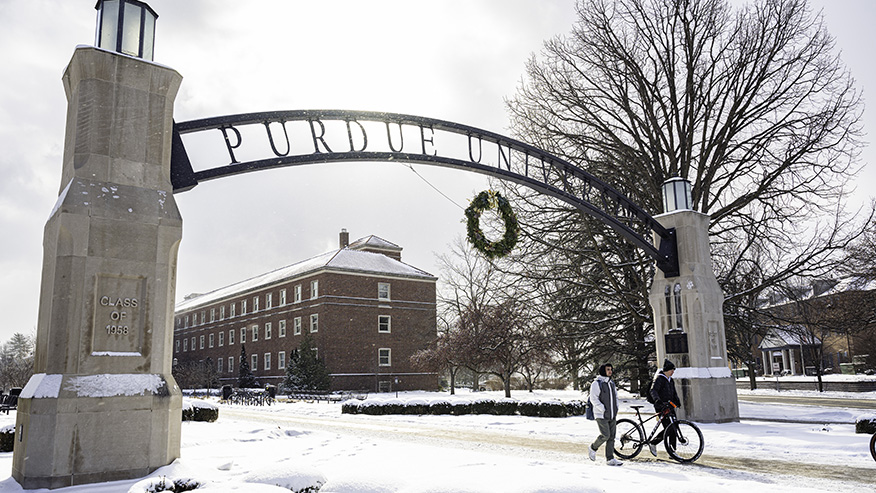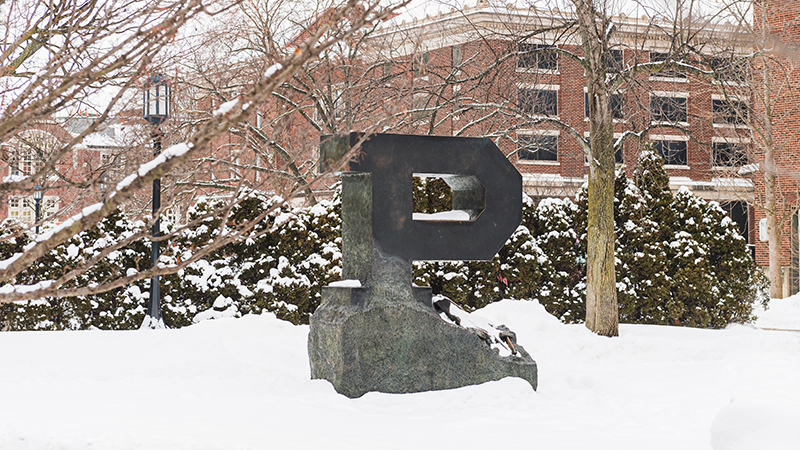Cybersecurity program among the nation’s strongest, drawing best and brightest undergrads to careers in highly demanded field

With its strong demand and industry growth potential, students are drawn to Purdue’s highly ranked computer science program specializing in cybersecurity. Studies show the number of people in cybersecurity jobs in 2023 reached a high of 5.5 million, while the annual cost of cybercrime globally is estimated to reach $13.8 trillion by 2028. (Purdue University photo/Brian Powell)
About this series: This story is part of an ongoing Purdue Today series highlighting programs ranked in the Top 10 or Top 10th percentile among our peers nationally, demonstrating the university’s persistent pursuit of excellence, innovation and transformative learning.
Samuel Ahrens is studying computer science on a cybersecurity track, challenged by the rigor of the Purdue University program and excited about what awaits him in a career paved by one of the nation’s best for cybersecurity studies.
“The classes are taught by professors and teaching assistants working on the forefront of cybersecurity research,” says Ahrens, a Los Angeles native who plans to graduate in December. “They give an exceedingly large amount of effort in teaching us their knowledge and helping us succeed as students. We are taught the technical fundamentals of cybersecurity and apply them to modern problems.”
Finding ways to safeguard computer systems, networks and the data they hold is no easy task. And it’s growing ever more challenging, especially with the rise of cybersecurity threats, ransomware and other attacks. Personal, financial or classified data becomes vulnerable to exploitation when a system has been breached.
And Purdue continues to equip the next generation of cybersecurity experts and industry leaders, offering one of the nation’s most storied, comprehensive and highly ranked undergraduate programs in cybersecurity. The program ranked No. 6 in the U.S. News & World Report survey released in September 2023, highlighting the nation’s top computer science department programs offering a cybersecurity specialization.
“First and foremost, Purdue’s high ranking for cybersecurity underscores our commitment to excellence in educating the next generation of computer scientists. This leading position not only reflects the quality of education our students receive but also the caliber of research conducted by our faculty,” says Petros Drineas, professor and incoming head of Purdue’s Department of Computer Science. “By maintaining this position, we ensure that our graduates are equipped with the knowledge, skills and expertise needed to address the ever-evolving challenges in cybersecurity.”
During spring and summer 2023, U.S. News surveyed deans and senior faculty at 554 undergraduate computer science programs that met at least one of these criteria — housed a computer science bachelor’s degree program accredited by the Accreditation Board for Engineering and Technology, known as ABET; and, as a regionally accredited institution, awarded at least 20 computer science bachelor’s degrees in 2020-21.
ADDITIONAL INFORMATION
Purdue students like Ahrens, who are enrolled in the security track, focus on designing and developing secure software and using techniques for testing and assessing systems for secure operation. The cybersecurity specialization degree is offered through Purdue’s storied computer science program, the nation’s first to offer an advanced computer science degree in 1962. Purdue’s CS program for undergrads also ranked No. 18 overall in the U.S. News survey last fall.
By earning a CS degree with a specialization in cybersecurity, Boilermakers are prepared to become computer scientists trained in designing and developing secure software, while also gaining familiarity with the societal impact of insecure software and related infrastructure. The major’s holistic approach combines skills such as secure coding, cryptography, digital forensics, and UNIX fundamentals with analytical thinking and criminology.
Driving the demand for a skilled cybersecurity workforce is the rise in online threats, new attackers and attack vectors. Sectors facing the most serious threat are finance, health care and the energy industries, which are highly regulated and must follow strict compliance guidelines to protect customer data.
The most-cited areas of cybersecurity skills shortages include cloud computing security, security analysis and investigations, and application security. And the looming impact of emerging technologies, notably quantum computing and artificial intelligence, is likely to change the dynamic landscape of cybersecurity dramatically.
The annual cost of cybercrime around the globe is estimated to reach $13.8 trillion by 2028. Meanwhile, the list of big-name data breach victims — from Facebook and LinkedIn to Target, Capital One, the Department of Homeland Security and countless more — continues to grow at an alarming pace.
At the same time, the number of people in cybersecurity jobs in 2023 reached its highest number ever: 5.5 million, according to the 2023 ISC2 Global Workforce Study. Yet that same study pointed to a serious industry shortfall, with estimates indicating the cybersecurity workforce needs to grow at an annual rate of nearly 13% to keep pace with demand.
Purdue computer science professor Eugene H. Spafford says the National Institute of Standards and Technology, or NIST, has identified over 30 career paths as part of its National Initiative for Cybersecurity Education (NICE) framework. He also notes that Purdue was one of the original seven universities designated as a National Center of Academic Excellence in cybersecurity in 1999 and has remained in that august company for 25 years.
“Cybersecurity is a field that is constantly evolving,” Spafford says. “A solid technical background can help a practitioner understand and better adapt to changes. It also helps if the practitioner decides to move to an adjacent field.”
There’s an increased concern about the security, reliability and privacy implications of AI systems at all levels, Spafford adds. On the flip side, he sees increasing interest in using AI to support cybersecurity monitoring and response. Spafford is executive director emeritus of CERIAS, Purdue’s Center for Education and Research in Information Assurance and Security, the nation’s foremost center for cybersecurity as an interdisciplinary area of research and education.
“Even from a hardware perspective, the semiconductor industry is acutely aware of cybersecurity issues, such as supply chain security, hardware vulnerabilities, counterfeit components and others,” Spafford says. “Such concerns drive new research and funding opportunities, visibility and impact.”
With Purdue’s rich history in computer science, Dongyan Xu, Samuel Conte Professor of Computer Science says, the cybersecurity specialization program for undergraduates also is playing an essential role in the campuswide strategic initiative Purdue Computes.
“Our leading position in cybersecurity boosts — in a very positive and synergistic way — the advancement of Purdue Computes,” says Xu, who also serves as CERIAS director. “We collaborate extensively with many colleagues in AI, data science, and software and hardware systems. This is a true win-win for all.”
Undergraduate John Henry Slater, an honors computer science major in the Class of ’26, encourages prospective college students who are deeply curious about computing in any and all of its forms to take a close look at the career opportunities in the field of cybersecurity.
“It’s been two years now since I joined Purdue CS, and I’ve never once looked back,” the Washington state native says. “My studies allow for enough specificity for me to gain deep insight into subjects I’m passionate about, while still offering ample flexibility for me to explore new topics both inside and outside the field of computing.”
Writer: Phillip Fiorini, pfiorini@purdue.edu
Contributing: Emily Kinsell, ekinsell@purdue.edu



